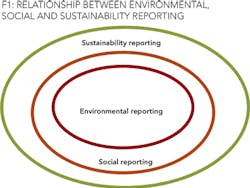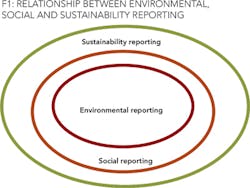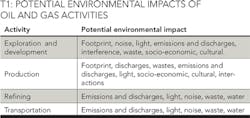Environmental accounting and reporting
OIL AND GAS COMPANIES ADOPTING POLICIES AIMED AT BALANCING ECONOMIC PERFORMANCE WITH SOCIAL RESPONSIBILITIES
DR. ABDULLAH HAMOUD ISMAIL, ALYEMENIA UNIVERSITY, SANA'A, YEMEN
GLOBAL WARMING, ozone depletion, and environmental pollution are environmental concerns that affect everyone. Global warming, for example, is evidenced from different indications, such the notable heightening in global average air and ocean temperatures, the extensive snow and ice melting, and the increasing global average sea level.
Global temperatures also showed an increase that ranged from 1.0-1.6 degrees Fahrenheit in the past century, and this increase is forecasted to continue to rise to 2.0-11.5 degrees in the current century (Jewell, 2007). Thus, more and more global natural disasters occur, which alerts humans to the need to act responsibly with regard to the environment. Consequently, environmental issues are receiving increased attention worldwide at different levels (international organizations, governments, environmental organizations and groups, the media, and the public at large).
Awareness of the role of economic and business activities on the depletion of natural resources as evidenced by global warming, greenhouse gas emissions and deforestations, and social environments as evidenced by the rich-poor gap and increasing poverty in developing nations is widespread around the global community. So, among the largest consumers of natural and social resources, business organizations have come under increased pressure to justify the nature and scale of their consumption. Specifically, business organizations, particularly industrial communities, are considered more and more as responsible for their impact on the environment and society. Corresponding to this increasing attention, businesses are adopting new policies that aim to balance their economic performances against their social responsibilities. As a result, interest in environmental accounting and reporting has grown rapidly, and environmental accounting and reporting occupy a significant place within the strategy of many corporations.
ENVIRONMENTAL ACCOUNTING
Accounting is the language of finance and is a service activity. In the modern era, accounting has witnessed rapid improvement and has become a means to serve the society, rather than just to serve owners and managers of projects. The American Accounting Association (AAA) has recognized the social dimension for accounting by determining the accounting objectives including the social aspect. Based on the statement of basic accounting theory prepared by a committee authorized by the AAA, the objectives of accounting are determined as: "1) Making decisions concerning the use of limited resources, including the identification of crucial decision areas, and determination of objectives and goals; 2) Effectively directing and controlling an organization's human and material resources; 3) Maintaining and reporting on the custodianship of resources; 4) Facilitating social functions and controls."
The past two decades have witnessed a gradually increasing demand for economic and financial data regarding environmental and natural resources. Thus, accounting has a key role in the reporting of environmental responsibility of various entities (industrial, commercial, or service) at the entire levels (micro or macro). Accounting has become involved in the achievement of new objectives like the measurement and evaluation of potential/actual environmental impacts of projects and organizations.
These objectives are of great significance in that they allow information users to reach environmentally sound decisions. Thus, traditional accounting has extended to cover a new type of accounting that focuses on the environmental impacts of an organization's activities, which is known as environmental accounting. Environmental accounting (also called ecological, natural resource, green accounting) has a key role in facilitating environmental data to various users in all levels.
The US Environmental Protection Agency (EPA) defines environmental accounting as "management accounting practices that enable the incorporation of environmental cost and benefit information into business decisions." The Institute of Management Accountants in the USA defines environmental accounting as "the identification, measurement, and allocation of environmental costs, the integration of these environmental costs into business decisions, and the subsequent communication of the information to a company's stakeholders." It is also defined as "a subset of accounting which involves activities, methods and systems; and deals with the recording, analysis and reporting of environmentally induced financial impacts and the ecological impacts of a defined economic system such as an organization, a country or region" and as " a science looking on how the environmental aspects affect the conventional accounting system and whether it is an effective tool to measure and evaluated the environmental aspects of facilities."
There are many advantages for a company that adopts an environmental accounting. The most important advantages are; obtaining clear information about environmental costs for control and decision-making and meeting the ongoing requirements of various stakeholders including the government, investors, lenders, banks, non-governmental institutions, among others, detecting potential areas for savings and environmental improvements, and proper management of resources in an environmentally sound manner that will lead to direct returns including cost savings and reductions, and/or indirect returns like superior organization goodwill and reputation.
At the corporate level, environmental impacts are included in environmental accounting records, measures, analyses and reports to add to the corporate environmental strategy effectiveness. Corporate environmental accounting involves "provision of environmental performance related information to stakeholders both within, and outside, the organization." Thus, disclosing information relating to environmental aspects is considered as one of significant issues in relations to environmental accounting.
ENVIRONMENTAL REPORTING
Environmental reporting is defined by the Financial Accounting Standards Board (FASB) as "the information that is required to be disclosed by regulatory rule or because management considers it useful to those outside the enterprise and discloses it voluntarily." It is also defined as "the set of information items that relate to a firm's past, current and future environmental management activities and performance" and "information about the past, current and future financial implications resulting from a firm's environmental management decisions or actions."
Environmental reporting is "an umbrella term that describes the various means by which companies disclose information on their environmental activities." It is also defined as "a process through which companies often disclose environmental information to their stakeholders to provide evidence that they are accountable for their activities and the resultant impact on the environment," and "a set of information items that relate to a firm's past, current, and future environmental management activities and performance," or as "any written passage about company's environmental issue and activity."
Environmental reporting, as a part of social responsibility reporting, first received considerable attention in the 1970s, but slowed down in the 1980s because of the attention shift towards economic issues like unemployment and recession. In the late 1980s, social reporting resurfaced with a concentration on issues regarding the environment. It has had a rapid expansion in the 1990s and grew to develop into one of the top significant reflections of interactions between business and environment.
Environmental reporting continued its diffusion and improvement as a result of the governments' focus on heavy polluting industries and the introduction of some related rules. In an oil and gas context, several environmental incidents such as the Exxon Valdez Oil Spill in 1989 resulted in an increasing importance of environmental reporting.
Environmental reporting occupies a prominent place within a firm`s reporting strategy. Environmental information reporting is an attractive subject as information itself entails living quality. Investors require environmental information for their assessment of the effects of environmental risks upon future operations in terms of finance and investment. Because cost implication - which has relevance to present shareholders- could affect future earnings, new investors are aware of (among other) environmental contingent liabilities. It was recognized that environmental reporting is perceived as a mechanism used to improve image of the organization. Thus, reporting on environmental performance helps organizations manage relationships with their stakeholders. This reveals the importance of reporting of environmental information for investors and organizations.
Consistent with an increase in public concern with environmental issues, environmental reporting has taken on a more important role in recent years. To help companies report on their environmental aspects, many international organizations have issued guidelines and principles. For example, the CERES Principles laid down by the Coalition Environmentally Responsible Economies in 1992, the PERI Guidelines laid down by the Public Environmental Reporting Initiative in 1993, the ISO14000 Standard established by the International Organization for Standardization in 1996, and the Sustainability Reporting Guidelines established by the Global Reporting Initiative in 1999 and reviewed in 2002 and 2006.
Corporate environmental reporting is a part and an important element of corporate social responsibility reporting. Social responsibility reporting, including two dimensions, namely environmental and social aspects, received considerable in the 1970s. Later on, in the 1980s, its role declined, and subsequently, it re-emerged in the late 1980s with more focus on environmental issues. Since that time, social and environmental reporting continued to grow. Nevertheless, from 2002, reporting of social and environmental performance has been extended to cover another dimension, namely economic issues. A new type of reporting, including all three dimensions (environment, social, and economic), has emerged, which is called sustainability, or triple bottom line (TBL) reports.
Thereafter, instead of publishing separate social or environmental reports, companies started publishing sustainability reports. However, choosing to publish pure environmental report, social responsibility report or sustainability report varies from one company to another.
The environment is always seen as a distinct category of corporate social responsibility (CSR), and corporate environmental reporting (CED) is also seen as a subdivision of the larger area of corporate social responsibility reporting (CSRD), and additionally, CED is a subcategory of sustainability reporting (see Figure 1).
Based on stakeholder and legitimacy theories, firms use social and environmental reporting to improve their image in the eyes of different stakeholder groups and public in general and in turn gain their legitimacy for existence. Thus, environmental reporting is considered a tool which could help companies to influence society's perceptions toward corporate operations.
Moreover, environmental reporting is considered an obligation and a stakeholder right as this type of information is utilized by different groups of stakeholders to assist their decision making. It is well recognized that environmental reporting serves a firm's stakeholders purposes. Corporate environmental reporting enriches the information quality of stakeholders, which in turn enables them to make more accurate estimates. It also affects how they perceive its legitimacy. Environmental reporting can be a significant factor in investor decision-making and a medium for managing, negotiating, or manipulating stakeholders.
Prior studies evidenced several benefits a company can potentially gain as a result of its environmental reporting. For example, competitive advantage has been identified as one of the benefits that can be associated with the reporting of corporate environmental information. It has been shown that investor reactions were more favorable to companies with prior environmental reporting.
Several studies have revealed that social and environmental reporting has a significant positive effect on corporate performance. There are many economic benefits from environmental reporting. For example, eco-efficient and proactive environmental strategies and activities have been found to lead to higher profitability and greater corporate value. Specifically, studies have indicated that corporate social responsibility reporting has a positive influence on corporate financial performance. Moreover, it is evidenced that earnings quality is positively affected by social and environmental reporting. It was found that higher quality CSR reporting translates into economic consequences such as better pricing terms and lower cost of capital and greater stock liquidity. In general, it is believed that those companies that ignore the importance of CED/CSD are likely to see negative consequences in the future.
ENVIRONMENTAL ACCOUNTING, REPORTING IN OIL AND GAS INDUSTRY
The oil and gas industry is among the industries with the greatest impacts on the environment. According to the International Energy Agency, energy-related carbon dioxide (CO2) emissions are the majority of global greenhouse gas (GHG) emissions, while oil and gas are the largest source of fuel combustion emissions and responsible for approximately 53% of global energy-related CO2 emissions in 2013.
Oil and gas is among the industries with the greatest impact on the environment. The overall environmental impact of petroleum operations on the natural environment is very high, as the operations of this industry can cause air pollution and water pollution, both of which can be detrimental to the natural environment.
There can be adverse effects on the environmental at each stage of oil and gas development - exploration, development, production, transportation, and refining. Several environmental risks are inherent to oil and gas activity - natural resource depletion, air emissions, interference in the territories, biodiversity impacts, and waste disposal, to name just a few.
In addition, oil and gas activity has the potential to endanger the occupational health and safety of people engaged in such activities. Environmental concerns have increased worldwide as petroleum companies have expanded their activity in new regions of the globe. Table 1 illustrates the environmental impacts of oil and gas operations.
In addition to the environmental effects that result from normal oil and gas operations, the effects may result in occasional events such as, oil spills and explosions Environmental incidents such as oil spills, gas explosions, and fires often can cause enormous ecological and human destructions. Several vital environmental incidents that occurred in the oil and gas industry worldwide have revealed the significant impact of this industry's activities on the environment, which in turn have contributed to increasing concern of public and other stakeholders regarding oil and gas companies' environmental impacts. As a result, oil and gas companies are facing increasing pressure to disclose information regarding their environmental performance.
During the last four decades, the oil and gas industry has witnessed several critical environmental incidents, such as the Exxon Valdez oil spill offshore Alaska in 1989, the Deepwater Horizon disaster in the Gulf of Mexico in 2010, which was considered as one of the largest oil spill in history and the worst environmental disaster in the US. Table 2 illustrates the most significant oil spills around world during the last four decades.
In general, polluting industries spend a lot of money to decrease the environmental impact of their operations. The adverse environmental impact of the oil and gas industry affects the industry's economic performance, as this environmentally sensitive industry is subject to costly environmental regulation.
Studies show that the risks arising from specific environmental incidents affect the reporting practices of the particular company and of the other companies operating in the same industry. For example, a study revealed that after the Exxon Valdez oil spill off Alaska in 1989, companies affiliated with the oil and gas industry dramatically increased environmental reporting. Another study indicated that the Gulf of Mexico oil spill in 2010 raised questions about the extraction methods used by the oil and gas industry as a whole. Subsequently, many oil and gas companies chose to increase their environmental reporting. It is generally recognized that environmental reporting for the petroleum industry is important because oil and gas activity has a profound effect on the natural environment.
ABOUT THE AUTHOR
Abdullah Hamoud Ismail, PhD, is a budgeting and expenditures control manager at the Ministry of Oil and Minerals in Yemen. He has more than 15 years of experience in oil and gas accounting and finance. Ismail received a PhD in accounting from the University Utara Malaysia. He is an assistant professor in the Department of Accounting at Alyemenia University in Sana'a, Yemen.




